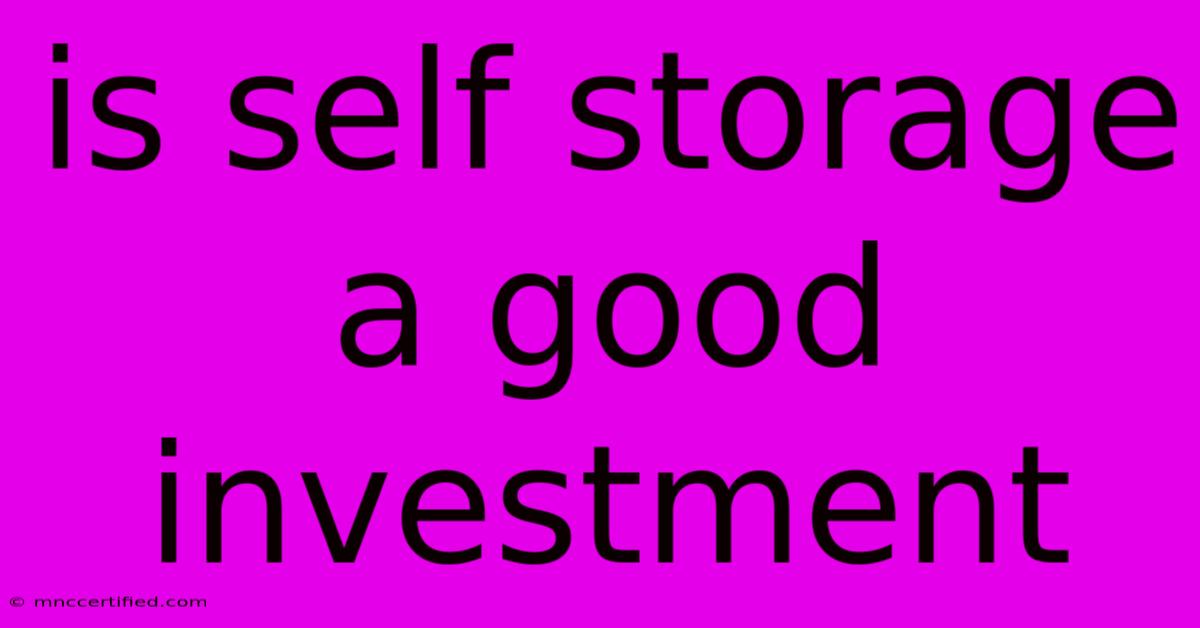Is Self Storage A Good Investment

Table of Contents
Is Self Storage a Good Investment? A Comprehensive Guide
Self storage. The seemingly simple concept of renting out extra space has quietly become a significant player in the real estate investment world. But is self storage a good investment? The answer, as with most things in finance, is: it depends. This comprehensive guide will delve into the pros and cons, helping you determine if self storage aligns with your investment goals.
The Allure of Self Storage: Why Investors are Drawn In
Several factors contribute to self storage's growing popularity among investors:
High Demand, Consistent Cash Flow
The demand for self storage units remains remarkably consistent, regardless of economic fluctuations. Life events like moving, downsizing, renovations, and even business expansions all drive the need for extra storage space. This translates to predictable rental income, a key attraction for investors seeking stability.
Relatively Low Maintenance
Compared to other real estate investments like apartment buildings or commercial properties, self storage facilities require relatively low maintenance and operational costs. While some upkeep is necessary, the hands-off nature of this investment can be a significant advantage.
Recession-Resistant Investment
While no investment is entirely recession-proof, self storage tends to weather economic downturns better than many other asset classes. People need storage during both prosperous and challenging times, making it a relatively stable investment option.
Potential Downsides: Navigating the Challenges
While the benefits are compelling, it's crucial to acknowledge potential drawbacks before diving in:
High Initial Investment Costs
Acquiring or developing a self storage facility requires a substantial upfront capital investment. This includes purchasing land, construction (if building new), and equipping the facility. Securing financing may also be challenging for first-time investors.
Competition in the Market
The self storage industry is competitive, particularly in densely populated areas. Thorough market research is essential to identify locations with high demand and low supply to maximize profitability. Understanding your local competitors is critical.
Property Management Responsibilities
While generally low-maintenance, self storage still demands some management. You'll need to handle tenant relations, rent collection, maintenance, and potentially marketing. Outsourcing some of these tasks is possible but adds to the operational costs.
Due Diligence: Key Factors to Consider
Before investing in self storage, conduct thorough due diligence:
Location, Location, Location: Market Analysis is Crucial
Analyze the local market demand for storage units. Consider factors like population density, demographics, average household income, and the presence of competing facilities. A detailed market analysis is paramount.
Property Condition and Potential for Improvement
If purchasing an existing facility, assess its condition thoroughly. Look for potential for upgrades or renovations to enhance rental rates and attract tenants. Consider value-add opportunities to boost ROI.
Financing and Cash Flow Projections
Secure appropriate financing and develop realistic cash flow projections. Factor in all expenses, including mortgage payments, property taxes, insurance, maintenance, and marketing. Accurate financial planning is critical for success.
Legal and Regulatory Compliance
Familiarize yourself with all applicable local, state, and federal regulations related to self storage. Compliance is essential to avoid legal issues and penalties.
Is Self Storage Right for You?
Ultimately, whether self storage is a good investment for you depends on your individual circumstances, risk tolerance, and investment goals. It’s a potentially lucrative venture, offering consistent cash flow and relative recession resistance. However, it demands thorough research, careful planning, and a willingness to navigate the associated challenges. Seek professional advice from financial advisors and real estate experts before making any decisions. Consider consulting with experienced self storage operators to gain valuable insights into the industry's specifics. By carefully weighing the pros and cons and conducting thorough due diligence, you can make an informed decision that aligns with your financial aspirations.

Thank you for visiting our website wich cover about Is Self Storage A Good Investment. We hope the information provided has been useful to you. Feel free to contact us if you have any questions or need further assistance. See you next time and dont miss to bookmark.
Featured Posts
-
Michael Hosmar Fisher Investments
Nov 20, 2024
-
Matthew Murphy Fisher Investments
Nov 20, 2024
-
Investing In Whisky For Beginners
Nov 20, 2024
-
Seji Alexander Fisher Investments
Nov 20, 2024
-
Tour Operator Liability Insurance
Nov 20, 2024